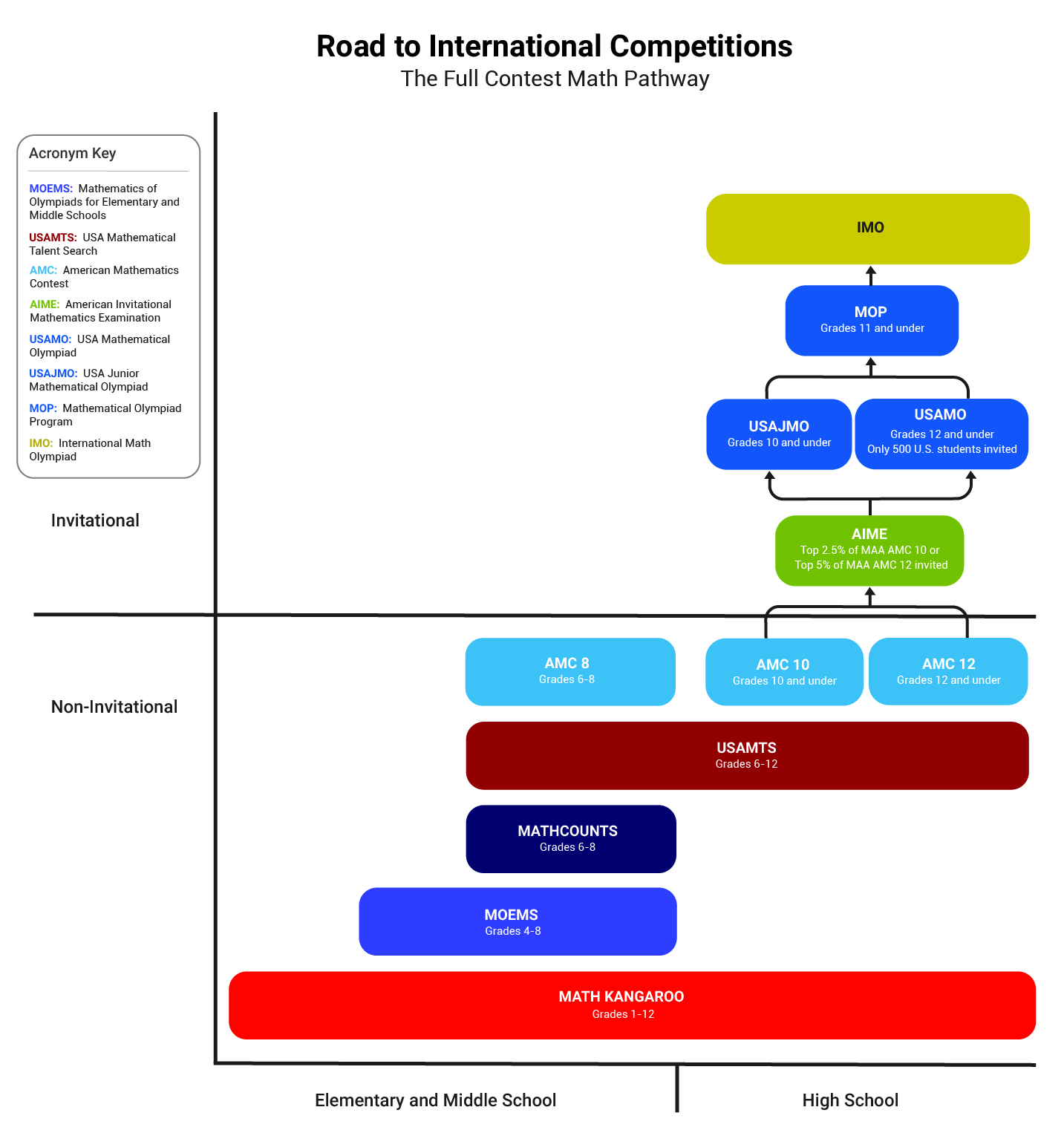The Full Contest Math Pathway
Welcome to the World of Contests!
The world of mathematical competitions is well-established, long-running, and full of acronyms! For young problem-solvers and their families, it can be overwhelming to face all of the different contest names, ways to participate, and materials that can help best prepare contestants.
We're breaking down everything you need to know about math contests, including how to find contests, register for the right one, and fully prepare.
But first, a handy chart. Reference contests by age group, and whether or not you can simply sign up — or need to be invited.

Art of Problem Solving (AoPS) builds courses across a range of math fields, but we got our start in the world of contests. In fact, the first AoPS textbooks were developed in response to the results of the first Mandelbrot Competition, a contest cofounded by Richard Rusczyk, Sandor Lehoczky, and Sam Vandervelde (which ran from 1990 to 2019). We've since expanded outwards, into a full curriculum for online and in-person classes.
How to Find Math Contests
The best way to find math contests to participate in is to check in with your school: Most national competitions are either proctored directly by schools or require a teacher to register a team. Ask your school to find out what math competitions they'll be participating in during the school year. If they aren't planning to currently, ask them to join!
Another good resource is your local Math Circle. We've also gathered a list of the most well-known competitions, which you can find below. For a more comprehensive competitions list, check out the AoPS Wiki's Mathematics Competitions.
How to Succeed at Math Contests
Succeeding doesn't mean getting all the answers right. It's knowing how best to approach challenging problems and accelerating deeper understanding.
So what does it take to succeed at math contests? The best recommendation we can make is to practice. Whether by taking courses, reading books, or working on problems from previous tests, practice will help you approach competitions feeling confident and prepared.
We have several articles on math competitions from the AoPS team, including a few by AoPS Founder, Richard Rusczyk, who started in the competition space himself!
- What are the pros and cons of math competitions?
- What if you're not competitive?
- How do you write a strong math solution?
Free Practice Contests and Other Resources
AoPS offers a lot of ways to get your contest practice in.
One of the best ways to practice is through a real competition experience. At AoPS, we run a variety of Practice Contests to help students sharpen their in-competition skills. Designed by the AoPS curriculum team, our practice contest problems are completely new and different from past competitions.
Check out the AoPS Practice Contest Platform.
We also have many practice problems archived, plus links to other free problems elsewhere online. Find past problems from dozens of national and international competitions for your own practice at our Contest Collections page.
For a friendly competition-style game, AoPS offers For the Win!, our premier competition game styled after the MATHCOUNTS Countdown Round. For the Win! uses problems pulled from MATHCOUNTS, MOEMS, AMCs, and more.
The AoPS Wiki also offers a comprehensive resources list that includes practice problems, outside links, and forum posts that those new to the contest world may find helpful. For the competitions highlighted below, we've linked to specific resources to use along your math contest journey.
The Road to International Competitions
We've compiled a grand list of the most common contests you'll hear about in the US, from elementary through high school. Scroll down to learn more about each!
Elementary Level Math
Math Kangaroo
Age Range/Grade Level: Grades 1-12
Invitation Required: No
How to Participate: Held at a local participation center (often schools or math circles), Register on the website
Format: 75 minutes
- Grades 1-4: 24 Questions
- Grades 5-12: 30 Questions
About:
The Math Kangaroo competition takes place on the third Thursday in March at registered Math Kangaroo Participation Centers. There are no restrictions on participation eligibility outside the ability to read and answer questions. You can find the list of registered centers at the website.
The Math Kangaroo competition started in Australia in the 1980s, and has expanded to become one of the largest international competitions for school students.
MOEMS
Age Range/Grade Level:
- Elementary: Grades 4-6
- Middle School: Grades 6-8
Invitation Required: No
How to Participate: Schools, home schools, and institutes
Format: 30 minutes, 25 questions
About:
The Mathematical Olympiads for Elementary and Middle Schools (MOEMS) are problem-solving contests for teams of up to 35 students in grades 4-8. Each month, from November through March, students take part in 30-minute contests.
Created in 1977 by Dr. George Lenchner, the Math Olympiads went public in 1979. Last year, nearly 170,000 students from 6,000 teams worldwide participated in the Olympiads, including all 50 states and about 35 countries.
Middle School-Level Math
MATHCOUNTS Competition Series
Age Range/Grade Level: Grades 6-8
Invitation Required: No
How to Participate: Schools register to participate.
Format: Varies depending on round
AoPS Resources:
MATHCOUNTS/ AMC 10/12 Advanced
AoPS Academy: Middle School Contest Math
About:
MATHCOUNTS brings middle school students from across the nation to compete in a school-based competition. Schools can register 1–15 students to compete at the chapter level and beyond. The Competition Series runs for 4 rounds: Sprint Round, Target Round, Team Round, and Countdown Round.
In addition to the Competition Series, MATHCOUNTS also runs the National Math Club and the Math Video Challenge to help students foster a love of challenging math.
MAA AMC 8
Age Range/Grade Level: Under 14.5 at the time of the test, AND Grade 8 and under
Possible Topics: Counting and probability, estimation, proportional reasoning, elementary geometry including the Pythagorean Theorem, spatial visualization, everyday applications, and reading and interpreting graphs and tables. Does not include algebra.
Invitation Required: No
How to Participate: Schools register for the competition. Or through local testing centers.
Format: Multiple Choice (25 questions, 40 minutes)
AoPS Resources:
Past AMC 8 Problems
AoPS Academy: Middle School Contest Math
AoPS Academy Virtual Campus: Contest Math 6
AoPS Academy Virtual Campus: Contest Math 7
About:
The American Mathematics Contest 8 offers middle school students an opportunity to work through interesting, challenging problems and explore problem solving on a deeper level. For students interested in moving into the Olympiad route, the MAA AMC 8 is a great starting experience.
High School-Level Math
MAA AMC 10/12
Age/Level:
- AMC 10: Under 17.5 at time of test, AND Grade 10 or under
- AMC 12: Under 19.5 at time of test, AND Grade 12 or under
Possible Topics:
AMC 10: Covers high school curriculum up to 10th grade and often other topics, like counting.
AMC 12: Covers entire high school curriculum excluding calculus
Invitation Required: No
How to Participate: Schools register for the competition. Or through local testing centers.
Format: Multiple Choice (25 questions, 75 minutes)
AoPS Resources:
AoPS Academy Virtual Campus: Contest Math 8
About:
The first competition in the series of Mathematical Association of America's (MAA) qualifying competitions that potentially lead to a spot on the USA team for the International Mathematics Olympiad.
Top scores on the AMC 10/12 are a prerequisite to qualify for an invitation to take the AIME.
MAA AIME (American Invitational Mathematics Exam)
Age/Level: Under 19.5 at time of test, AND Grade 12 or under
Invitation Required: Yes
How to Participate: Invitation based on AMC 10/12 scores
Format: Free Response (15 questions, 3 hours)
AoPS Resources:
Special AIME Problem Seminar A
Special AIME Problem Seminar B
About:
Students who performed well on the AMC 10/12 are invited to take the American Invitational Mathematics Exam. This is the second exam needed to qualify for the USA(J)MO.
Top scores on the AIME are a prerequisite to qualify for an invitation to take the USA(J)MO. AIME scores can also be included on college applications.
USA(J)MO (USA Junior Math Olympiad)
Age/Level:
- USAJMO: Under 17.5 at time of test, AND Grade 10 or under
- USAMO: Under 19.5 at time of test, AND Grade 12 or under
Invitation Required: Yes
How to Participate: Invitation based on a combination of AMC 10/12 and AIME scores.
Format: Proof-based (6 questions, 9 hours, 2 days)
AoPS Resources:
Past USA(J)MO Problems
WOOT (Worldwide Online Olympiad Training)
About:
The top-scoring AMC 10 and AMC 12 participants are invited to take the United States of America (Junior) Mathematical Olympiad. A combination of top scores of the two exams determines which students qualify for the Mathematical Olympiad Program, and who will be picked for a spot on the USA IMO team.
IMO (International Math Olympiad)
Age/Level: Under 19.5 at time of test, AND Grade 12 or under
Invitation Required: Yes
How to Participate: As part of the USA IMO team. IMO is traditionally held in a different country each year. Due to the pandemic, the 2020 IMO was held virtually.
Format: Proof-based (6 questions, 9 hours, 2 days)
AoPS Resources:
WOOT (Worldwide Online Olympiad Training)
About:
Every year, the US selects six contestants to participate on the US International Mathematics Olympiad team.
The International Mathematics Olympiad is the oldest international competition of its kind, running since 1959. The annual competition is held in a different country each year, with over 100 countries from 5 continents.
After three decades of being shut out in the International Math Olympiad, the U.S. Olympiad team has won gold in four out of the past seven years — with teams composed entirely of AoPS students.
Independent Math Contests
USAMTS
Age/Level: Middle and High School Students
Invitation Required: No
How to Participate: Register directly on the website
Format: Written justifications
AoPS Resources:
Past USAMTS Problems
About:
Part of the Art of Problem Solving Initiative, the USA Mathematical Talent Search (USAMTS) is a free individual competition where students are given a month to work out their solutions. The goal is to help students develop their problem-solving skills, improve their writing abilities, and have fun with challenging problems. Mathematicians grade the student solutions and return them with comments. The competition runs for three months, one for each round.
The USAMTS is one of the ways to enter the process to select the USA Mathematical Olympiad team. Students who score well on the USAMTS are invited to take the AIME.
Purple Comet Math Meet
Age Range/Grade Level: Middle and High School Students
Invitation Required: No
How to Participate: Register on the website with an adult supervisor.
Format:
- Middle School Contest: 20 questions, 60 minutes
- High School Contest: 30 questions, 90 minutes
About:
Purple Comet Math Meet is a free, annual online team mathematics competition that's been running since 2003. Teams of 1–6 students compete by submitting solutions within a set period of time in a 10-day window. Each team must have an adult supervisor to register on the website and officially "start" the competition.
There are four categories of teams:
- Teams whose members all attend the same large school
- Teams whose members all attend the same small school
- Teams whose members attend more than one school or are homeschooled
- Teams with no restrictions that do not compete for awards
















